References
African Storybook,
http://www.africanstorybook.org/ [Tip: hold Ctrl and click a link to open it in a new tab. (Hide tip)] (accessed 15 March 2018).
Barrett, A., Ali, S., Clegg, J., Hinostroza, J.E., Lowe, J., Nikel, J., Novelli, M., Oduro, G., Pillay, M., Tikly L. and Yu, G. (2007)
Initiatives to Improve the Quality of Teaching and Learning: A Review of Recent Literature, background paper for the EFA GMR 2008, UNESCO [online]. Available at:
http://unesdoc.unesco.org/ images/ 0015/ 001555/ 155504e.pdf (accessed 7 June 2018).
Barsalou, L.W. (2008) ‘Grounded cognition’,
Annual Review of Psychology, vol. 59, pp. 617–45 [online]. Available at:
https://www.annualreviews.org/ doi/ 10.1146/ annurev.psych.59.103006.093639 (accessed 15 March 2018).
Chambers, A. (2011) Tell Me: Children, Reading, and Talk with the Reading Environment, Woodchester, UK: The Thimble Press.
Cummins, J. (1991) ‘Interdependence of first- and second-language proficiency in bilingual children’, in Bialystok, E. (ed.)
Language Processing in Bilingual Children, pp. 70–89, New York, NY: Cambridge University Press [online]. Available at:
http://dx.doi.org/ 10.1017/ CBO9780511620652.006 (accessed 20 March 2018).
Gimenez, P., Bugescu, N., Black, J.M., Hancock, R., Pugh K., Nagamine, M., Kutner, E., Mazaika, P., Hendren, R., McCandliss, B.D. and Hoeft, F. (2014) ‘Neuroimaging correlates of handwriting quality as children learn to read and write’,
Frontiers in Human Neuroscience, vol. 8, p. 155 [online]. Available at:
https://www.ncbi.nlm.nih.gov/ pmc/ articles/ PMC3958698/ (accessed 15 March 2018).
Goddard Blyth, S. (2000) ‘Early learning in the balance: priming the first ABC’, Support for Learning, vol. 15, no. 4, pp. 154–8.
Kioko, A.N., Ndung’u, R.W., Njoroge, M.C. and Mutiga, J. (2014) ‘Mother tongue and education in Africa: publicising the reality’,
Multilingual Education, vol. 4, no. 18, pp. 1–11 [online]. Available at:
https://multilingual-education.springeropen.com/ track/ pdf/ 10.1186/ s13616-014-0018-x?site=multilingual-education.springeropen.com (accessed 15 March 2018).
Moon, B. and Umar, A. (2013) ‘Reorientating the agenda around teacher education and development’, in Moon, B. (ed.) Teacher Education and the Challenge of Development: A Global Analysis, pp. 227–38, Abingdon: Routledge.
Ouane, A. and Glanz, C. (eds) (2011)
Optimising Learning, Education and Publishing in Africa: The Language Factor A Review and Analysis of Theory and Practice in Mother-Tongue and Bilingual Education in Sub-Saharan Africa, Hamburg: UNESCO Institute for Lifelong Learning/ Tunisia: Association for the Development of Education in Africa [online]. Available at:
http://unesdoc.unesco.org/ images/ 0021/ 002126/ 212602e.pdf (accessed 15 March 2018).
Schweisfurth, M. (2013) Learner-centred Education in International Perspective: Whose Pedagogy for Whose Development?, Abingdon: Routledge.
Schweisfurth, M. (2015) ‘Learner-centred pedagogy: towards a post-2015 agenda for teaching and learning’, International Journal of Educational Development, vol. 40, pp. 259–66.
TESSA,
http://www.tessafrica.net/ (accessed 15 March 2018).
Unicef (2016)
The Impact of Language Policy and Practice on Children’s Learning: Evidence from Eastern and Southern Africa, Unicef [online]. Available at:
https://www.unicef.org/ esaro/ UNICEF(2016)LanguageandLearning-FullReport(SingleView).pdf (accessed 20 March 2018).
World Vision International (n.d.) ‘Unlock literary teacher training video modules’, World Vision International [online]. Available at:
https://www.wvi.org/ education-and-life-skills/ unlock-literacy-teacher-training-video-modules (accessed 20 March 2018).
World Vision International [YouTube user] (2017a) ‘Module four: Phonemic awareness: what classroom activities can promote phonemic awareness?’, YouTube, 3 April [online]. Available at:
https://www.youtube.com/ watch?v=9babWRRyFdo (accessed 20 March 2018).
World Vision International [YouTube user] (2017b) ‘Module three: Formative assessment: how do I use formative assessment effectively in the classroom?’, YouTube, 3 April [online]. Available at:
https://www.youtube.com/ watch?v=Z2gULw7TUZE (accessed 20 March 2018).
